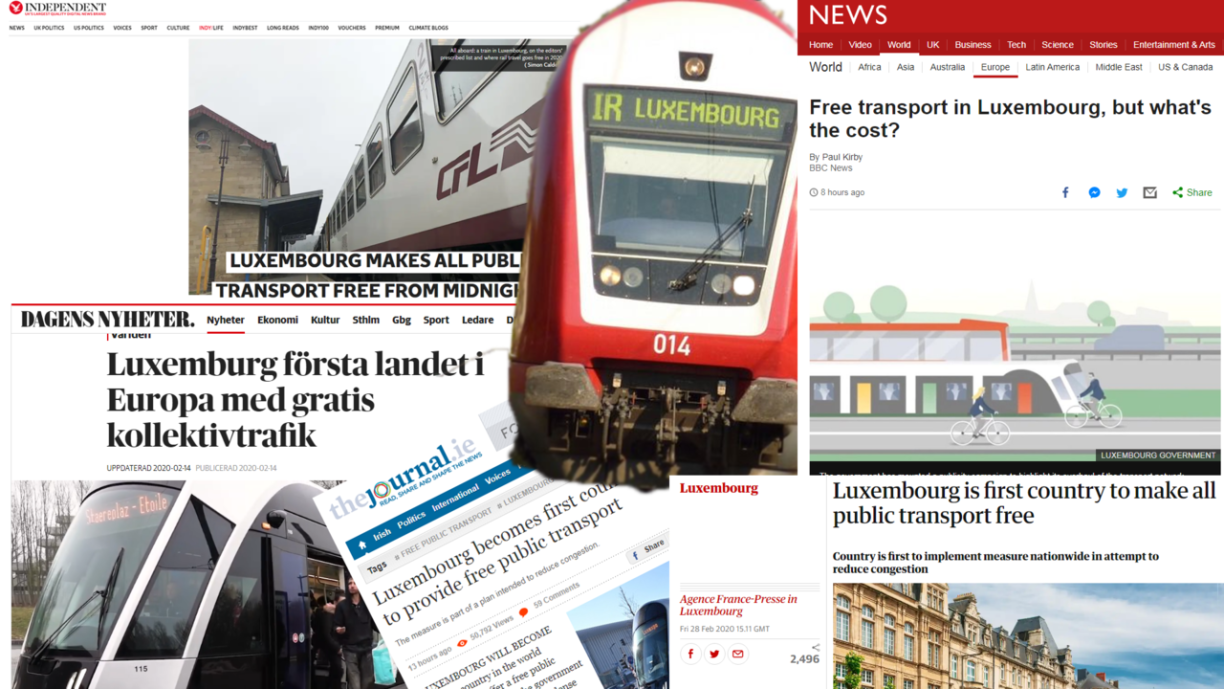
You may recall that we did a similar rundown a little while back, in the months leading up to the official launch date of free transport. At that point, we found that the majority were quite sceptical of the endeavour - the BBC wasn’t altogether positive, highlighting in particular issues for cross-border workers. Two academics at the University of Luxembourg published a damning piece in the Conversation, while PRI interviewed another researcher who was similarly sceptical.
In this earlier article we also included a poll, asking whether our readers believed people in general would be more likely to use public transport once it became free at point of use. 54% of you said yes, 36% no, and 10% weren’t sure.
A fair chunk of the international coverage from the last few days is based heavily or entirely on an article written by AFP, a news agency (whose services we also use). This article hails Luxembourg as the first in the world to make public transport free, and states that the measure “will affect approximately 40% of households and is likely to save each one around €100 per year.” However, it also notes that only buses and trains only account for 32 and 19% of trips to work, respectively.
Irish news outlet The Journal, who ran the AFP article, also published a poll earlier today, asking their readers if they would be in favour of introducing free public transport in Ireland. At the time of writing, 71.7% said yes, 25.7% no, with the remainder undecided.
The Independent‘s Simon Calder quoted Minister for Mobility and Public Works, François Bausch, as saying that the move is “the social icing on the cake of the global strategy for a multimodal revolution.” On the whole, Calder’s article is quite positive in its stance, and quotes transport writer Nicky Gardner as saying that the move is revolutionary, and “apart from encouraging commuters to shift from their cars, it will slowly transform the attitudes of an entire population towards public transport.”
Writing for Fast Company, Adele Peters is less convinced, noting that fares “were already relatively inexpensive,” and quoting the aforementioned University of Luxembourg academics highly sceptical of the initiative.
In a balanced report, Swedish paper Dagens Nyheter interviewed yours truly (among others - see my earlier opinions below, as well as one by Nathalie Lodhi) for their piece on the move, and include arguments both for and against it.
Despite arguing that our “buses are old-fashioned,” the most balanced report is arguably found on through the BBC, who highlight Luxembourg’s high ratio of cars per capita, the impact on cross-border workers, frequency of delays, and Luxembourg’s low petrol prices, while also highlighting the potential social impact and the goals behind the move.
How Luxembourg’s free public transport is being discussed in the international press
Academic journal article slams Luxembourg’s free public transport initiative
Opinion - Martin Jonsson: If you want people to drive less, sort out the traffic mess
Opinion - Nathalie Lodhi: Free public transport isn’t enough to encourage people to go car-free
Opinion - Martin Jonsson: Free public transport - the cherry on a half-baked cake?